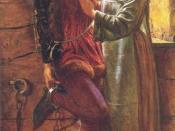Marriage as a Form of Justice in Measure for Measure Measure for Measure has long been defined by critics as a "problem"ÃÂ comedy due to its nonconformity to the typical comedic formula and conventional standards of Shakespearian comedy. Not only is there an absence of romantic love, the usual bawdy jokes concerning sex take on a dark twist, conveying instead images of death and destruction. Even the four marriages in the end do not constitute a happy ending, for they are introduced as a means of justice, a way of rectifying wrongs and complying with societal expectations. Matrimony is shown as a solution to a variety of problems: preserving or restoring a woman's honorable reputation, fulfilling financial obligations, and providing for illegitimate children. It is, by and large, a state that the characters appear to be unwillingly, or at least reluctantly, forced into by the decrees of the Duke. Moreover, it is the men who are allegedly being punished and held accountable for their actions, while the women are not unhappy with the circumstances under which they are wed.
Although these marriages do not bear any illusions of romantic love or promise of happiness, they share a commonality in the meting of justice for Claudio, Angelo, and Lucio, and their respective brides. They coalesce into a new kind of formula, and though it may not be conventional according to Shakespeare's standards, it does make sense. However, the marriage of the Duke and Isabella does not appear to satisfy any form of justice and is thus inconsistent with the others. Is this another problem in a problem comedy? Perhaps we should take a closer look at these relationships.
Claudio and Julietta, who are clearly the couple whose relationship most closely resembles that of a romance, appear to have every reason to...

![[Portrait of Duke Ellington and Sonny Greer, Aquarium, New York, N.Y., ca. Nov. 1946] (LOC)](https://s.writework.com/uploads/6/61491/portrait-duke-ellington-and-sonny-greer-aquarium-new-york-n-thumb.jpg)
